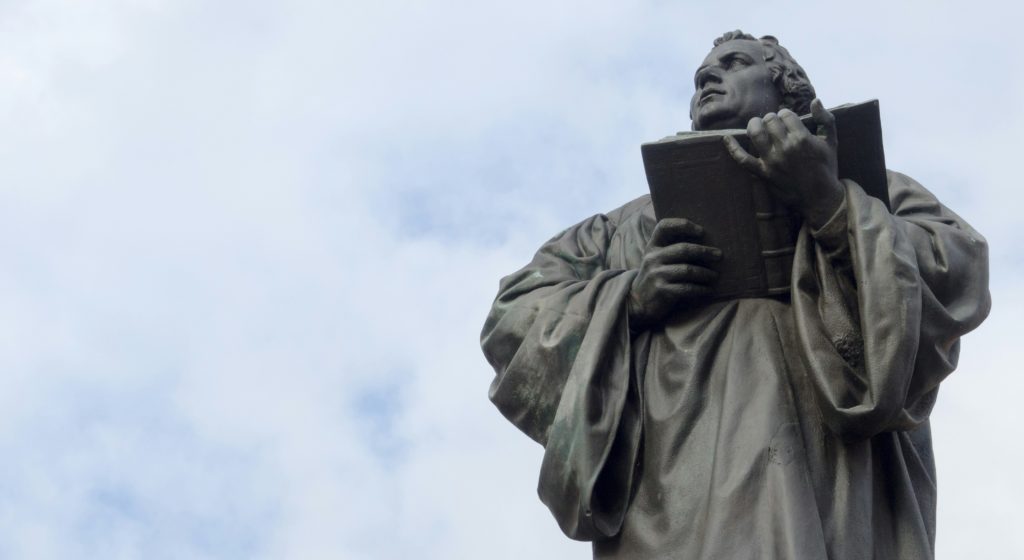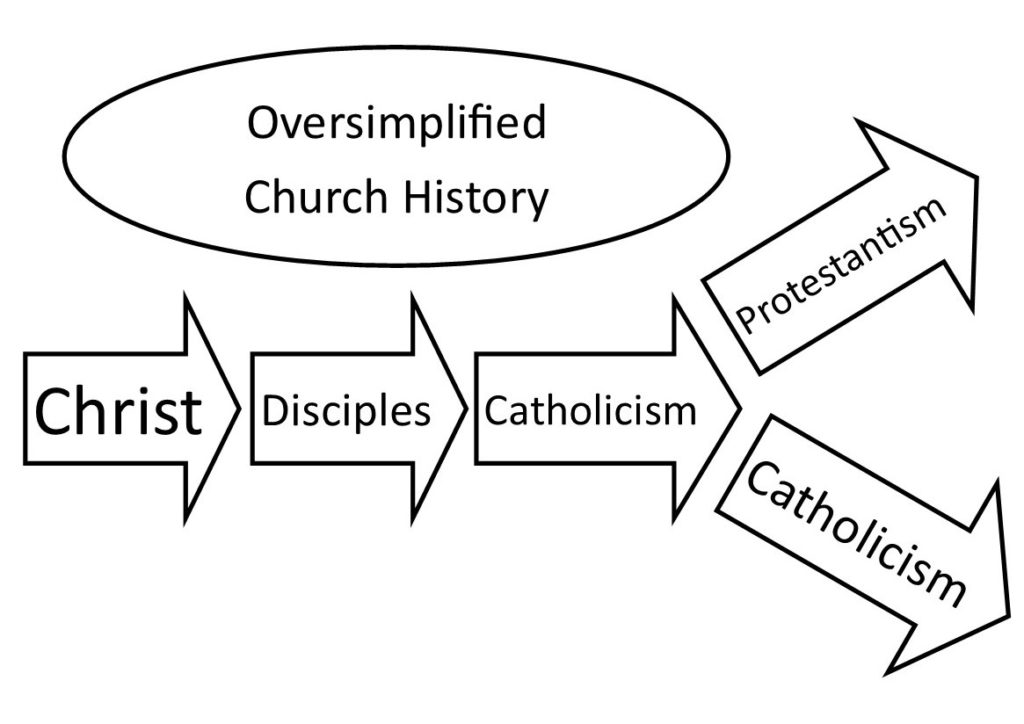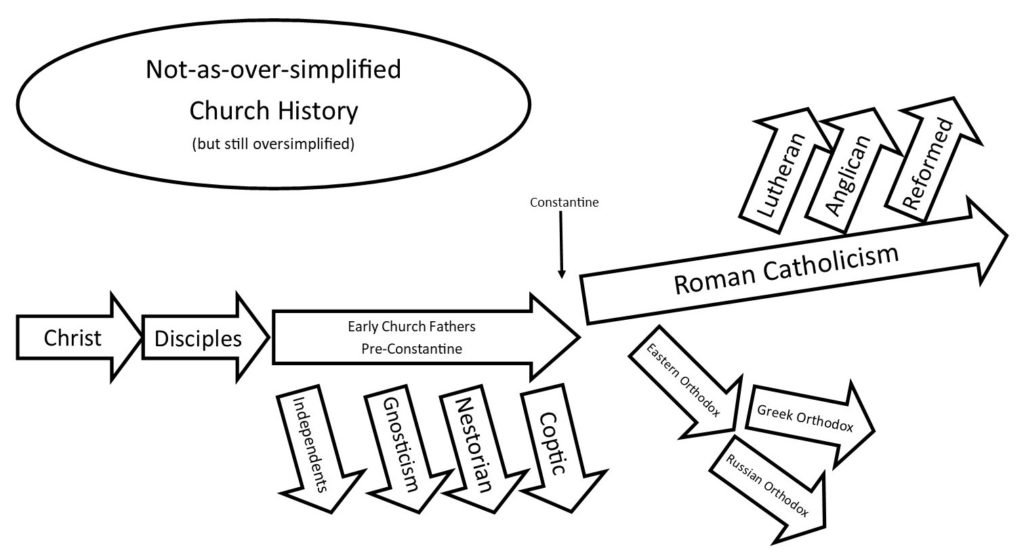
I picked up my son from school and he started telling me some of the things they had learned about in his high school history class. He said that they had studied the Reformation that day. I joked and asked him if he wanted me to tell him everything they got wrong. He looked at me strangely so I spouted off a few tidbits that I knew didn’t match the perspective that most history textbooks take. Kind of surprised him I think.
The way many people present the history of the Reformation, its reasons and its impact, is tainted by overly-simplified historical narratives and denominational propaganda. Yes, even a lot of Baptists get much of the Reformation wrong.
What is the Reformation?
The Reformation is a period of great social, political, and religious upheaval that took place around the 1500’s in Europe. It is a period of transition from the Middle Ages into the Modern Age. Its scope is vast and there is no section of European society and culture of the time that is not affected by its influence. The term Reformation does not have a clear technical meaning. It could refer to attempts to reform Christianity and Catholicism or it could refer to the general way Europe was “re-formed” during this time.
The general narrative that is usually told is that Martin Luther disagreed with aspects of Roman Catholic doctrine and practice so he “protested” (that is the root of the word Protestant, those that “protest” aspects of Catholicism). It is often presented that the starting point of the Reformation is Luther’s posting of the Ninety-Five Theses in 1517. Then from Luther’s influence other leaders and groups emerge to challenge the Catholic religion and authority (which was also highly secular during this time).
A general timeline of the history of Christianity is sometimes presented as:

Countering the Narrative
If you spend any time studying history you will realize how vast and practically infinite the influence are that shape our world. As a Christian, I do believe that God’s hand is behind all of this (Daniel 2:21, etc.). Our finite human understanding tries to make sense of what appears to be turbulent chaos by detecting patterns, causes, and effects. We constantly reassess the story of humanity in light of new theories and discoveries. We are bound by our own times, mindsets, theories, cultures, languages, and a host of other factors. As much as we want to say that history is a fixed study, it is not.
I open with the above observation to show that anyone’s opinion on the Reformation must be flawed and differ from the true history. The one thing we have today that others have not had is five centuries of perspective and analysis. I am humbly adding my own to that multitude of opinions.
I have what I describe as a “low view” of the Reformation. While I acknowledge its importance in the development of Western Civilization and applaud some of the its core tenets, I do not see it as one of the greatest events in the history of Christianity. In fact, I think the wrong view of the Reformation greatly damages how that history is viewed.
Let me give you some points to consider to defend my position:
I. Catholicism did not have a monopoly on Christianity.
This is the oversimplified view illustrated in the diagram I presented before. It presents the Roman Catholic church as the only very of Christianity, even if you believe their teachings and practices to be false in the centuries before Luther.
The fact is that Catholicism was only a single branch of the family tree of Christianity. Granted, it became an extremely powerful branch (especially in Western civilization). A more accurate diagram of the history of Christian denominations might look like:

To view the Roman Catholic church as the primary expression of Christianity in history is to (1) have an extremely Eurocentric view of history and (2) buy into the Catholic propaganda that they are the one true church. There are countless other sects that have existed, some so small and so localized to have escaped the notice of historians. So many of these existed long before the true beginning of Roman Catholicism in the fourth century. So many of these were not birthed by opposition to Roman Catholicism. Millions of believers have lived that had no attachment to Roman Catholicism.
II. Protestantism did not discover anything new.
The most basic presentation of Reformation theology is the Five Solas: sola scriptura (Scripture alone), sola fide (faith alone), sola gratia (grace alone), solus Christus (Christ alone), soli Deo gloria (God’s glory alone). None of these positions were new, though men like Luther may have found them on their own. There is plenty of evidence for this for those who wish to study it out.
III. There were Reformers before the Reformation.
The date of 1517, when Luther presented his Ninety-Five Theses, is commonly given as the beginning of the Reformation. This is completely arbitrary. There were many so-called “proto-Protestant” leaders and movements before this date. Examples include Peter Waldo and the Waldensians, John Wycliffe, and Jan Hus and the Hussites.
IV. The Reformation was largely political.
This in part because the ideas of State and Church were so interwoven. But it cannot be overlooked that impetus behind the establishment of the Protestant Church of England had much to do with the politics of Henry the VIII. It cannot be overlooked that Martin Luther’s work was only successful because of the political backing of men like Frederick III, Elector of Saxony. It cannot be overlooked that John Calvin’s work was largely successful because of political intrigue in Geneva between the Grand Council and the Duke of Savoy.
I am not saying that the Reformation was completely political and ignoring any spiritual victories it gained. What I am saying is that it is not simply a grassroots theological movement that shook the world. Behind many aspects of the Reformation are kings and princes vying for earthly power and dominion. Many of these were simply tired of papal authority over them and seeing Rome drain their wealth and resources.
V. Some Reformers did not reform enough.
While some leaders like Calvin or Zwingli sought to establish a form of Christianity based solely on Scriptures, others kept much of the Catholic traditions and trappings. Lutheranism and Anglicanism are two that kept much of the liturgy and practices of Catholicism. Most of the most famous reformers still tried to keep a union of church and state.
VI. Groups existed that did not participate in reform.
As I mentioned before, the tenets of the Reformation were not new. They had both existed before historically and were actively held and practiced in Europe before, during, and after the Reformation. Often these are mislabeled as “Radical Reformers”, even if they did not directly attempt any reforming of Catholicism.
My contention is that throughout the history of Christendom that small, independent groups existed that help to a simple, orthodox Christianity like the Reformers promoted. These go by many names in history and are often lumped together with other groups the Catholics considered heretical. Yet, if you read carefully between the lines of history, it is clear that there always existed groups that held the Bible as sole authority, taught salvation by grace through faith, rejected infant baptism, and refused to pray to Mary. These groups did nor build grand cathedrals or run nation-states. They existed in the background of society and faced persecution and ridicule.
During the Reformation era, many of these were lumped into the Anabaptist category. That is such a broad term that it includes pacifists like the Amish and the warmongers that led the Münster rebellion. Many of these faced persecution and propaganda from both the Catholics and Reformers.
Misinterpreting the Reformation
I think one of the main reasons that the Reformation is misinterpreted is that of bias. For Americans, we owe a great debt to the spiritual, cultural, and political effects of the Reformation. For Protestants, they want to aggrandize their own history and accomplishments. If you are an Italian Roman Catholic I am sure you have a very different view. The same would go for many others across the globe.
The biggest problem I have with embellishing the Reformation is that it can actually weaken the positions held by Protestants. If you hold that true Christianity is based on Scripture alone, you must logically also hold that the truths of the Reformation preexisted it. You must hold that anyone with a Bible can and will come to the same conclusions about true Christianity. To hold any other position says that either (A) true Christianity was lost for centuries between the first centuries A.D. and the Reformation or (B) that the ideas of the Reformation are only another evolution of Christianity that was bred by discontent with Catholicism. Either of these greatly undermines the defense of Reformation ideas.
A Baptist Position
I am a Baptist. I cannot find from history how the Reformation invented the distinctive Baptist beliefs and therefore do not count myself as a Protestant. While I share many positions with my Reformed brethren, I do not count myself as a product of the Reformation. When I trace the history and heritage of Baptists, it is clear to me that men and women that believed like me existed during and before the Reformation. Whether or not you want to fully embrace Baptist successionism as found in J.M Carroll’s Trail of Blood is beside the point. It is clear from history that the core positions of the Baptists predate the Reformation, just as the Reformation’s own positions do.
While I am thankful for many of the benefits of the Reformation, especially the renewed call of salvation by grace through faith, I cannot ignore that not every aspect of it was positive. The ties of church and state were only strengthened in many areas. Some Reformers became persecutors of those that disagreed with them. Many errors in Catholic theology and practice were not completely eradicated in some denominations.
I would challenge the reader to research the full story of the Reformation. It is not nearly as simple of a story as a revival of true Christianity as many make it to be.